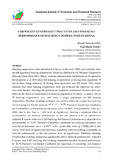| dc.contributor.author | Kyaitha, R. S | |
| dc.contributor.author | Nzioki, Paul M | |
| dc.date.accessioned | 2022-03-21T11:09:44Z | |
| dc.date.available | 2022-03-21T11:09:44Z | |
| dc.date.issued | 2017 | |
| dc.identifier.issn | 2501-9430 | |
| dc.identifier.other | https://zenodo.org/badge/DOI/10.5281/zenodo.885428.svg | |
| dc.identifier.uri | http://hdl.handle.net/123456789/5552 | |
| dc.description.abstract | Housing cooperatives were introduced in Kenya in the early 1980s and currently there are 650 registered housing cooperatives which are affiliated to the National Cooperative Housing Union (NACHU). Official statistics obtained from the Ministry of Co-operative Development as at 2010 show 424 housing co-operatives as having been registered, 79 out of these being dormant, 16 having been liquidated and 329 active. This clearly indicates that some housing cooperatives have not achieved the objectives for which they were formed. This begs the question on Corporate Governance Practices have any effect on the financial performance of housing cooperatives in Kenya. A sample size of 59 housing cooperatives was used from a target population of 650 housing cooperatives. Random sampling technique was used to obtain the sample size and was derived using the Fischer formula: . Pearson’s Correlation Coefficient for accountability and financial performance was r = 0.366**, with probability value (p = 0.000) that is less than α = 0.01 level of significance showing a moderate effect of accountability on financial performance at the one percent level of significance. Adjusted R square value was 0.118 implying that financial performance is dependent on accountability by 11.8%. Pearson’s Correlation Coefficient for auditing committees and financial performance was r = 0.351**, with a probability value (p = 0.000) that is less than α = 0.01 level of significance showing a significant effect of auditing committees on financial performance at the one percent level of significance. Therefore, findings revealed that auditing committees significantly affects financial performance. Adjusted R square was 0.107 implying that auditing committees predicts financial performance by 10.7%.Pearson’s Correlation Coefficient for separation of ownership and financial performance was r = 0.289*, with probability value (p = 0.000) that is less than α = 0.05 level of significance showing a significant effect of separation of ownership on financial performance at the five percent level of significance. Therefore, it was found out that separation of ownership significantly affects financial performance. Adjusted R square value was 0. 066. This implied that financial performance is dependent on separation of ownership. Separation of ownership predicts financial performance by 6.6 %.Pearson’s Correlation Coefficient for moderating variables and financial performance was r = 0.310*,with probability value (p = 0.000) that is less than α = 0.05 level of significance showing a significant effect between moderating variables and financial performance at the five percent level of significance. Therefore, it was found out that moderating variables significantly affects financial performance. Adjusted R square value was 0.079 implying that moderating variables predicts financial performance implying that financial performance is dependent on moderating variables by 7.9%. | en_US |
| dc.language.iso | en | en_US |
| dc.publisher | European Journal of Economic and Financial Research. Volume 2 │ Issue 3 │ 2017 | en_US |
| dc.subject | corporate governance, financial performance, housing cooperatives, Kenya | en_US |
| dc.title | CORPORATE GOVERNANCE PRACTICES AND FINANCIAL PERFORMANCE OF HOUSING COOPERATIVES IN KENYA | en_US |
| dc.type | Article | en_US |

